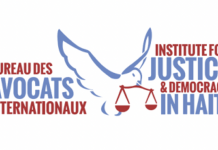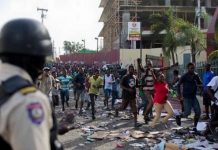by the Haiti
Elections Blog
Elections Blog
This Sun., Feb.
7 marked the 30th anniversary of Jean-Claude Duvalier’s departure and the end
of President’s Michel Martelly’s term. A last-minute negotiated deal secured
Martelly’s departure, but it may not succeed in producing a long-term solution.
Tensions leading up to Feb. 7 provoked violent confrontations between
pro-government paramilitaries and opposition protestors in Port-au-Prince,
resulting in one dead, as well as the cancellation of the first day of Carnaval. And
while foreign diplomats welcomed the accord, a number of opposition parties
raised objections to the agreement.
7 marked the 30th anniversary of Jean-Claude Duvalier’s departure and the end
of President’s Michel Martelly’s term. A last-minute negotiated deal secured
Martelly’s departure, but it may not succeed in producing a long-term solution.
Tensions leading up to Feb. 7 provoked violent confrontations between
pro-government paramilitaries and opposition protestors in Port-au-Prince,
resulting in one dead, as well as the cancellation of the first day of Carnaval. And
while foreign diplomats welcomed the accord, a number of opposition parties
raised objections to the agreement.
On Feb. 6, Martelly publicly signed
a political accord with Chancy Cholzer and Jocelerme Privert, the presidents of
the Chamber of Deputies and the Senate, respectively. The agreement confirmed
that Martelly would leave office and laid out a process for establishing a
transitional government to take over. As de facto Prime Minister Evans Paul
stays on, the Parliament will supposedly select a new provisional president
within five days following the end of Martelly’s term. The new president will
then engage in consultations to appoint a consensus prime minister and
“redynamize” the Provisional Electoral Council (CEP). Once a new government is
in place, the accord stipulates, it is responsible for implementing the
“technical recommendations” of the Evaluation Commission and “restarting” the
electoral process begun in 2015. The interrupted elections are to resume on Apr.
24, definitive results to be announced on May 6, and a new President sworn in
on May 14. [However, all of these dates would have to be established by the new
CEP, the independent institution which governs all electoral matters. – HL]
a political accord with Chancy Cholzer and Jocelerme Privert, the presidents of
the Chamber of Deputies and the Senate, respectively. The agreement confirmed
that Martelly would leave office and laid out a process for establishing a
transitional government to take over. As de facto Prime Minister Evans Paul
stays on, the Parliament will supposedly select a new provisional president
within five days following the end of Martelly’s term. The new president will
then engage in consultations to appoint a consensus prime minister and
“redynamize” the Provisional Electoral Council (CEP). Once a new government is
in place, the accord stipulates, it is responsible for implementing the
“technical recommendations” of the Evaluation Commission and “restarting” the
electoral process begun in 2015. The interrupted elections are to resume on Apr.
24, definitive results to be announced on May 6, and a new President sworn in
on May 14. [However, all of these dates would have to be established by the new
CEP, the independent institution which governs all electoral matters. – HL]
In his final speech as President on Sunday, Martelly expressed satisfaction with the political accord,
saying lawmakers “gave me a guarantee that the country is going to be stable.”
Martelly also directly referred to the electoral impasse, admitting that
although he had the sense of “a job well done,” there was also “a mission that
is not yet completed.” A small group of Haitian Bald-Headed Party (PHTK)
supporters greeted the outgoing president outside the parliament, wearing pink
shirts with the words “Je Suis Martelly” (I Am Martelly). Thousands of
anti-Martelly protesters also took to the streets in the capital, the mood a
mix of defiant celebration and uncertainty as to what comes next.
saying lawmakers “gave me a guarantee that the country is going to be stable.”
Martelly also directly referred to the electoral impasse, admitting that
although he had the sense of “a job well done,” there was also “a mission that
is not yet completed.” A small group of Haitian Bald-Headed Party (PHTK)
supporters greeted the outgoing president outside the parliament, wearing pink
shirts with the words “Je Suis Martelly” (I Am Martelly). Thousands of
anti-Martelly protesters also took to the streets in the capital, the mood a
mix of defiant celebration and uncertainty as to what comes next.
The international community were
unanimously favorable toward the accord, emphasizing the need to complete the
elections as quickly as possible. The Core Group welcomed the signing of the accord, seeing it as
“a crucial step towards overcoming the political challenges Haiti faces.” The
Core Group statement described the agreement as “a solution in keeping with the
Constitution” and invited “the actors concerned to implement all the
commitments entered into,” especially “the continuation of the electoral
process within the timeframes indicated.” The U.S. State Department also hailed the accord for ensuring “the continuity of
governance and the completion of the ongoing electoral process.” UN
Secretary-General Ban Ki-Moon likewise celebrated the accord for “providing a roadmap to
the swift conclusion of the electoral cycle underway.”
unanimously favorable toward the accord, emphasizing the need to complete the
elections as quickly as possible. The Core Group welcomed the signing of the accord, seeing it as
“a crucial step towards overcoming the political challenges Haiti faces.” The
Core Group statement described the agreement as “a solution in keeping with the
Constitution” and invited “the actors concerned to implement all the
commitments entered into,” especially “the continuation of the electoral
process within the timeframes indicated.” The U.S. State Department also hailed the accord for ensuring “the continuity of
governance and the completion of the ongoing electoral process.” UN
Secretary-General Ban Ki-Moon likewise celebrated the accord for “providing a roadmap to
the swift conclusion of the electoral cycle underway.”
The opposition’s Group of Eight
(G-8), on the other hand, immediately condemned the accord as anti-democratic and
unconstitutional. The G-8 denounced the large role given to parliament in the
accord, given the questionable legitimacy of many members of parliament.
Instead, the G-8 suggested an alternative solution by handing the
power to a judge of the Supreme Court and called for the establishment of an
electoral verification commission that would examine both the Oct. 25 and Aug.
9 elections. Fanmi Lavalas made a similar call for an investigation of both the presidential
and legislative elections, as did other parties such as FUSION, Kontrapèpla, and
OPL. The G-8 statement, however, was only signed by Samuel Madistin; although
officially still part of the G-8, Jude Célestin and his party LAPEH have not
yet made any statements regarding the accord.
(G-8), on the other hand, immediately condemned the accord as anti-democratic and
unconstitutional. The G-8 denounced the large role given to parliament in the
accord, given the questionable legitimacy of many members of parliament.
Instead, the G-8 suggested an alternative solution by handing the
power to a judge of the Supreme Court and called for the establishment of an
electoral verification commission that would examine both the Oct. 25 and Aug.
9 elections. Fanmi Lavalas made a similar call for an investigation of both the presidential
and legislative elections, as did other parties such as FUSION, Kontrapèpla, and
OPL. The G-8 statement, however, was only signed by Samuel Madistin; although
officially still part of the G-8, Jude Célestin and his party LAPEH have not
yet made any statements regarding the accord.
The accord was concluded on the
heels of a tense day in the capital and other cities. On Fri., Feb. 5, groups
of armed militia men claiming to be ex-soldiers from Haiti’s disbanded military
patrolled menacingly through Port-au-Prince, Les
Cayes, and other cities. In Port-au-Prince, the appearance of pro-government
paramilitaries coincided with a demonstration calling for Martelly’s
resignation. Paramilitaries fired shots at the demonstrators near Champs de
Mars, who responded by attacking the ex-soldiers with stones, resulting in the
death of one paramilitary. After Feb. 7, one paramilitary member warned, “all
illegal arms will become legal!” Neither UN Mission to Stabilize Haiti
(MINUSTAH) troops nor Haitian National Police (PNH) officers made any attempt
to control the paramilitaries.
heels of a tense day in the capital and other cities. On Fri., Feb. 5, groups
of armed militia men claiming to be ex-soldiers from Haiti’s disbanded military
patrolled menacingly through Port-au-Prince, Les
Cayes, and other cities. In Port-au-Prince, the appearance of pro-government
paramilitaries coincided with a demonstration calling for Martelly’s
resignation. Paramilitaries fired shots at the demonstrators near Champs de
Mars, who responded by attacking the ex-soldiers with stones, resulting in the
death of one paramilitary. After Feb. 7, one paramilitary member warned, “all
illegal arms will become legal!” Neither UN Mission to Stabilize Haiti
(MINUSTAH) troops nor Haitian National Police (PNH) officers made any attempt
to control the paramilitaries.
MINUSTAH condemned the violence in a statement issued the
following day and “noted with concern the organized presence of several dozen
people in green uniforms, some of whom were armed.” Although it was unclear who
was in charge of the armed men, former paramilitary leader and Senate candidate
Guy Philippe had recently threatened to have his supporters march on
Port-au-Prince. “We are ready for war,” Philippe said in a radio interview on Jan. 24. The G-8
pointed out the coincidence of the political accord and the deployment of paramilitaries,
criticizing the signatories for ignoring this “serious event” and the threat it
represents for democracy.
following day and “noted with concern the organized presence of several dozen
people in green uniforms, some of whom were armed.” Although it was unclear who
was in charge of the armed men, former paramilitary leader and Senate candidate
Guy Philippe had recently threatened to have his supporters march on
Port-au-Prince. “We are ready for war,” Philippe said in a radio interview on Jan. 24. The G-8
pointed out the coincidence of the political accord and the deployment of paramilitaries,
criticizing the signatories for ignoring this “serious event” and the threat it
represents for democracy.
Earlier in the week, protests
against the controversial arrival of an Organization of American States (OAS)
Special Mission had continued, with a sit-in held outside the U.S. Embassy on Feb. 4.
In a statement released on Thursday, the Coordination
Europe-Haiti (CoEH), for their part, urged the European Union to support
Haitian democracy, strongly criticizing the EU’s Electoral Observation Mission
for taking “the position of defending the legitimacy of the Oct. 25 election
outcome, even after the
Government of Haiti’s
decision to postpone
the second round indefinitely.” The EU Observation
Mission was the only international mission to explicitly take this stance. CoEH
urged the Mission to “prove its independence and professionalism” and “stop
minimizing the ‘serious’ irregularities, verging on fraud, as observed by the
BCEN and the CEEI during
their verifications, and denounced
by a large
majority of civil society and the political opposition.”
against the controversial arrival of an Organization of American States (OAS)
Special Mission had continued, with a sit-in held outside the U.S. Embassy on Feb. 4.
In a statement released on Thursday, the Coordination
Europe-Haiti (CoEH), for their part, urged the European Union to support
Haitian democracy, strongly criticizing the EU’s Electoral Observation Mission
for taking “the position of defending the legitimacy of the Oct. 25 election
outcome, even after the
Government of Haiti’s
decision to postpone
the second round indefinitely.” The EU Observation
Mission was the only international mission to explicitly take this stance. CoEH
urged the Mission to “prove its independence and professionalism” and “stop
minimizing the ‘serious’ irregularities, verging on fraud, as observed by the
BCEN and the CEEI during
their verifications, and denounced
by a large
majority of civil society and the political opposition.”
Despite strong opposition among
Haitians to foreign intervention, some foreign commentators claimed prior to
the accord that a Haitian-led solution was impossible. The Washington Post insisted in a Feb. 3
editorial that “a strong international hand is required, one that can encourage
or, if necessary, coerce the country’s political, civic and business leaders to
come to terms on a Haitian resolution.” The OAS Special Mission, which was
present during both the negotiations leading to the accord and the signing
ceremony on Feb. 6, judged that its presence had “a favorable impact
on the search for a consensus formula among the various groups.” The State
Department also highlighted the “constructive role” played by OAS
Special Mission in fostering a “spirit of consensus.”
Haitians to foreign intervention, some foreign commentators claimed prior to
the accord that a Haitian-led solution was impossible. The Washington Post insisted in a Feb. 3
editorial that “a strong international hand is required, one that can encourage
or, if necessary, coerce the country’s political, civic and business leaders to
come to terms on a Haitian resolution.” The OAS Special Mission, which was
present during both the negotiations leading to the accord and the signing
ceremony on Feb. 6, judged that its presence had “a favorable impact
on the search for a consensus formula among the various groups.” The State
Department also highlighted the “constructive role” played by OAS
Special Mission in fostering a “spirit of consensus.”
Following, Martelly’s verbal harassment of Liliane Pierre-Paul, a
journalist from Radio Kiskeya, women’s organizations and civil groups organized a gathering in support of Ms.
Pierre-Paul, Jean Monard Métellus, from Radio Television Caraïbes, and the
country’s independent media.
journalist from Radio Kiskeya, women’s organizations and civil groups organized a gathering in support of Ms.
Pierre-Paul, Jean Monard Métellus, from Radio Television Caraïbes, and the
country’s independent media.
While Martelly may be gone, the
resolution of Haiti’s electoral crisis is far from guaranteed. Martelly
departed as he came, as one headline put it (in reference to his
contested 2010 electoral victory): amid uncertainty and disorder.
resolution of Haiti’s electoral crisis is far from guaranteed. Martelly
departed as he came, as one headline put it (in reference to his
contested 2010 electoral victory): amid uncertainty and disorder.





